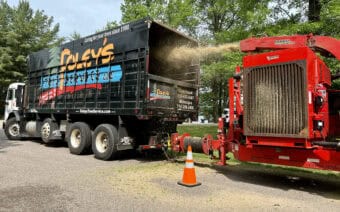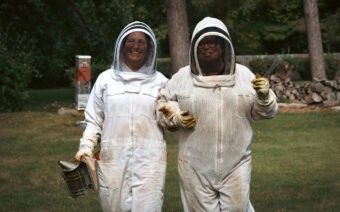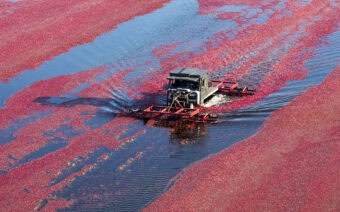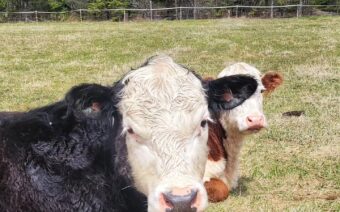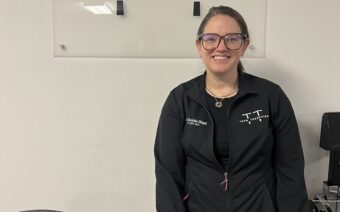
October 14, 2024
WAUPACA – Zoey Nelson and Sydney Brooks – sisters, business partners and farmers – said knowing where your food comes from should be black and white.
The sixth-generation farmers said it’s that simple, yet important, focus that inspired them to launch Black & White by Brooks Farms – a homestead beef and cheese business sourced from their Holstein dairy cows.
“We always had a vision that we wanted to have a product that came directly from our cows,” Nelson said. “We wanted to have our milk and our meat serve as a reflection of the hard work and care that we put in and to be able to hold a product at the end that came from our animals.”
The eventual push to finally make that happen, Nelson said, came from the local food movement that was sparked by the COVID-19 pandemic.
“That’s when we decided now was the time to dip our toes in the water with direct marketing,” she said.
During the onset of the pandemic, Nelson said the farm’s milk processor wasn’t able to take as much milk as it had in the past.
“We were forced to dump about a load of milk a month because schools were closed, restaurants were closed – there was just no avenue or market for the milk, so our processor wasn’t able to take all of it,” she said.
Nelson said they saw that as a sign for them to take the leap they had been thinking about for years – a jump that started with cheese.
“We worked with a local cheese processor – Union Star Cheese in Fremont – and had an agreement with them that they would take that load of milk… and small-batch craft an aged-white cheddar for us sourced exclusively from the milk from our Holstein cows,” she said.

The cheese was made in 2020, Nelson said, and put in shortage.
“We knew we wanted to do an aged cheddar, so that took a little patience,” she said. “We produce high-quality milk – that’s where our talents lie, but we knew we needed a talented cheesemaker. So, it’s been a really great partnership – we produce great milk, they produce great cheese and that’s where a great end product comes from.”
The pandemic-propelled local food trend, Nelson said, also served as inspiration for the beef side of Black & White.
“We also started (offering) beef from our dairy herd as well – which was something that wasn’t really being seen in the industry,” she said.
Typically, Nelson said dairy cows are bred with beef cattle that then produce a crossbreed beef crop.
Black & White, however, Nelson said, made the decision not to crossbreed their Holsteins and instead offer 100% Holstein meat.
“It’s dairy beef, it’s not raised for beef,” she said. “We saw the quality of the product from our cows and the beef that we always ate here growing up on the farm and had friends and family rave about – so we decided to showcase the Holstein cow.”
Nelson said this focus plays well into the farm’s sustainability model.
“The dairy cow is really the only animal in animal agriculture that can produce food throughout her entire lifetime, and then contribute to the food chain at the end of her lifetime as well,” she said. “We wanted to showcase the cyclicity of that dairy cow, everything that she’s able to produce in her lifetime. It’s a very sustainable model. That’s where our beef is kind of different in the industry.”
Launching the Black & White brand, Nelson said, has also provided them with an opportunity to interact with the end consumer.
“I deal with cows all day, every day, so to have the opportunity to introduce a product to people and work with people was a great part of launching this business – being able to make those connections between the cows and the people,” she said.
The food retail industry, Brooks said, “is a complete 180 difference from what we’re used to on the cow side of things.”
“We learned and are still learning about the food industry and how we, as dairy farmers, can provide that transparent perspective of where people’s food and cheese is coming from,” she said.
The sisters said the reaction they have received regarding Black & White products so far has been positive.
“On the cheese side of things – people rave about it,” Nelson said. “They can’t believe that it’s that young of a cheddar for the flavor profile they are tasting. Currently, we have a one-year and a two-year cheddar.”
Brooks said how great cheese is made starts with great milk.
“This cheese is exclusively sourced from our Holstein herd,” she said. “The components that go into the milk – the high-protein, high-fat components – really add flavor and texture quality to the cheese.”
Those very Holsteins, Nelson said, also served as inspiration for the brand’s name – Black & White by Brooks Farms.
“We’re very transparent on how we raise our animals and how we produce a high-quality product,” she said.
Multi-generational farm
As sixth-generation farmers, Brooks and Nelson said carrying on their family’s legacy means everything to them.
“We are a multi-generational farm,” Nelson said. “We were homesteaded back in 1855. On any given day, we have four generations that are working together.”
Grandpa Dodge, she said, is the fourth generation, and at the age of 85, still helps out on the farm.
“He winters in Arizona, but he’s still active throughout the summer here and with the fall harvest,” Nelson said. “Obviously, he’s retired, but farmers never really retire.”
Brooks and Nelson’s father, Ron, is also an active participant in the operation.

“That’s what makes farming, especially dairy farming, super unique here in Wisconsin – it is a family business,” Nelson said. “Ninety-seven percent of farms in the state are family-owned and operated. Technically, there’s seven generations with my dad’s seven grandchildren.”
Brooks said having the opportunity to be a part of the 1% of the world feeding the rest of the world is “truly special.”
“We are able to contribute to the food supply for not only the United States but the world,” she said. “Knowing that our milk, which is primarily made into cheese, is going around the world for food – that is just an incredible opportunity to be a part of.”
Though active members of their family’s farming operations growing up, the sisters – the youngest of four – said they were encouraged to explore other passions before deciding to return to the farm permanently.
“Sydney and I are two of four daughters on the farm – so lots of females on the farm,” Nelson said. “Our oldest two sisters actually took their own career path – one is a chiropractor and one is a marriage and family therapist.”
Though both Nelson and Brooks attended school looking to be involved in agriculture in some way or another, Nelson said that didn’t necessarily mean coming back to the farm.
“We were encouraged to be involved with arts and music and sports – because if you weren’t involved in a sport after school, you would be in the barn working,” she said. “So, that was a big incentive to be very involved throughout school… We actually have a rule here on the farm, that you have to go work off the farm after school before coming back.”
Nelson said she was originally on the pre-veterinary route at the University of Wisconsin-Madison.
“I decided about halfway through that I wanted to come back to the farm and work with my own animals instead of other people’s animals,” she said.
Brooks, on the other hand, took the agriculture marketing route.
She said she was inspired by the path her older sister Nelson took – moving away, pursuing her own thing and eventually returning to the farm.
“It was really inspiring to see not only your big sister, but a young female coming back into a male-dominated industry, and seeing the leadership and expertise she could bring back to the farm,” she said.
It was then, Brooks said, that she, too, pivoted her trajectory in school to dairy science and agriculture communication.
Building for the future
Shortly after she returned to the farm full-time, Nelson said they built brand-new facilities for their cows.
“We were in outdated facilities, and we knew going forward we needed a better barn for our cows and a better milking parlor for our cows,” she said. “So, back in 2017, we built a new facility with a new parlor, a new freestall barn – where the cows are housed – and every detail was put into making this the most comfortable, the quietest, the most relaxing environment for our animals.”
The naturally vented barn, Nelson said, has a climate center on the roof – “so there is really no day that the cows have bad weather inside the barn.”
“That climate center reacts to sun, wind, rain and is able to open and close doors and curtains, turn on fans, etc. to create a perfect environment inside that barn for the cows,” she said.
Nelson said they bed exclusively with sand bedding – “so our cows kind of lay on a beach all day.”
“It keeps them super cool in the summer and is insulative in the winter,” she said.
That relaxing and comfortable environment, Nelson said, extends into the milking parlor – which was a major focus of the 2017 project.
“We wanted it to be a relaxing environment,” she said. “We want it to be very quiet when the cows are coming in to be milked. They need that oxytocin release. They need to be relaxed. So, we created a very quiet parlor. Our staff of milkers treat these dairy cows as if they’re their own. We say ‘every cow here is a mother – which they are – so treat her how you treat your own mother.’”
Complimenting skills
Nelson said she and Brooks work well with each other – each with skill sets that compliment the other.
“Our brains work in different ways – they’re similar in some ways – but they do work in different ways, which really helps in the division of duties with Black & White,” she said. “We also learn from each other every day.”
Since she is on the farm full-time, Nelson said she manages the logistics and hard-skill side of things.
“I’m the one coordinating the cheese production, coordinating which animals we use for beef and dealing with getting the packaging and all of that squared away,” she said.
Working part-time on the farm and part-time off the farm in the agricultural marketing industry, Brooks said her role focuses on marketing the products.
Starting the Black & White brand from scratch, Brooks said, gave them a blank slate to create whatever they wanted.

“We came up with this idea, we brought it to life and now we’re bringing it to stores and consumers and restaurants,” she said. “We are able to pave our own path. We have the chance to craft our own story of how we want to continue building Black & White.”
As the farming duo continues to navigate the food industry, Nelson said they are partnering with a distributor out of Madison called Elegant Foods that delivers Black & White cheese to businesses throughout the state.
Nelson said they also partner with several local stores and restaurants that help showcase Black & White cheeses.
“We also have a seasonal – May to October – storefront on the farm where people are able to come and buy cheese and beef,” she said. “What’s unique about that is they’re able to watch cows being milked, are able to see cows and can meet the farmer while they’re here shopping.”
The long-term goal, Brooks said, is for Black & White to be statewide and nationwide.
“So, the next step that we’re looking at is getting into the shipping market,” she said. “We know Wisconsinites love cheese, but Wisconsin cheese sells well outside the state as well – that’s what Wisconsin is known for. We would love to take this nationwide to showcase Wisconsin dairy.”
More to come
With two- and three-year aged cheese already available, Nelson said Black & White’s five-year aged cheddar will be released soon.
“We also have cheese in storage that’ll be going to 10 years and hopefully 20 – so it’s definitely a labor of love and patience,” she said.
The goal, Nelson said, is making an aged cheddar that makes it out to 20 years – “but you have to start somewhere.”
“We had to start in 2020 to be able to release that in 2040,” she said.
As the brand continues to grow, Nelson said they have decided to remain niche-based – meaning sticking with the aged cheddar offerings.
“We are known for our aged white cheddars,” she said. “We don’t mess with any of the flavor profiles, or add anything in. We really found our niche in the aged cheddar market, and our variety will be in the form of age classes.”
For the Black & White brand, Nelson said the potential is “limitless.”
“One thing that’s guaranteed is that people are always going to need to eat,” she said. “So being able to produce that product, I think, the future is limitless where that could take us.”
As far as the farm as a whole, Nelson said with its herd of about 600, any growth there will coincide with its sustainability model.
“We have enough land to feed our cows to put nutrients back out on the land,” she said. “It’s really full circle here on the farm.”
For more on Black & White by Brooks Farms, visit brooksfarms1855.com.
 Eau Claire-Twin Cities passenger rail project on track
Eau Claire-Twin Cities passenger rail project on track TitletownTech is nearly on the clock
TitletownTech is nearly on the clock


